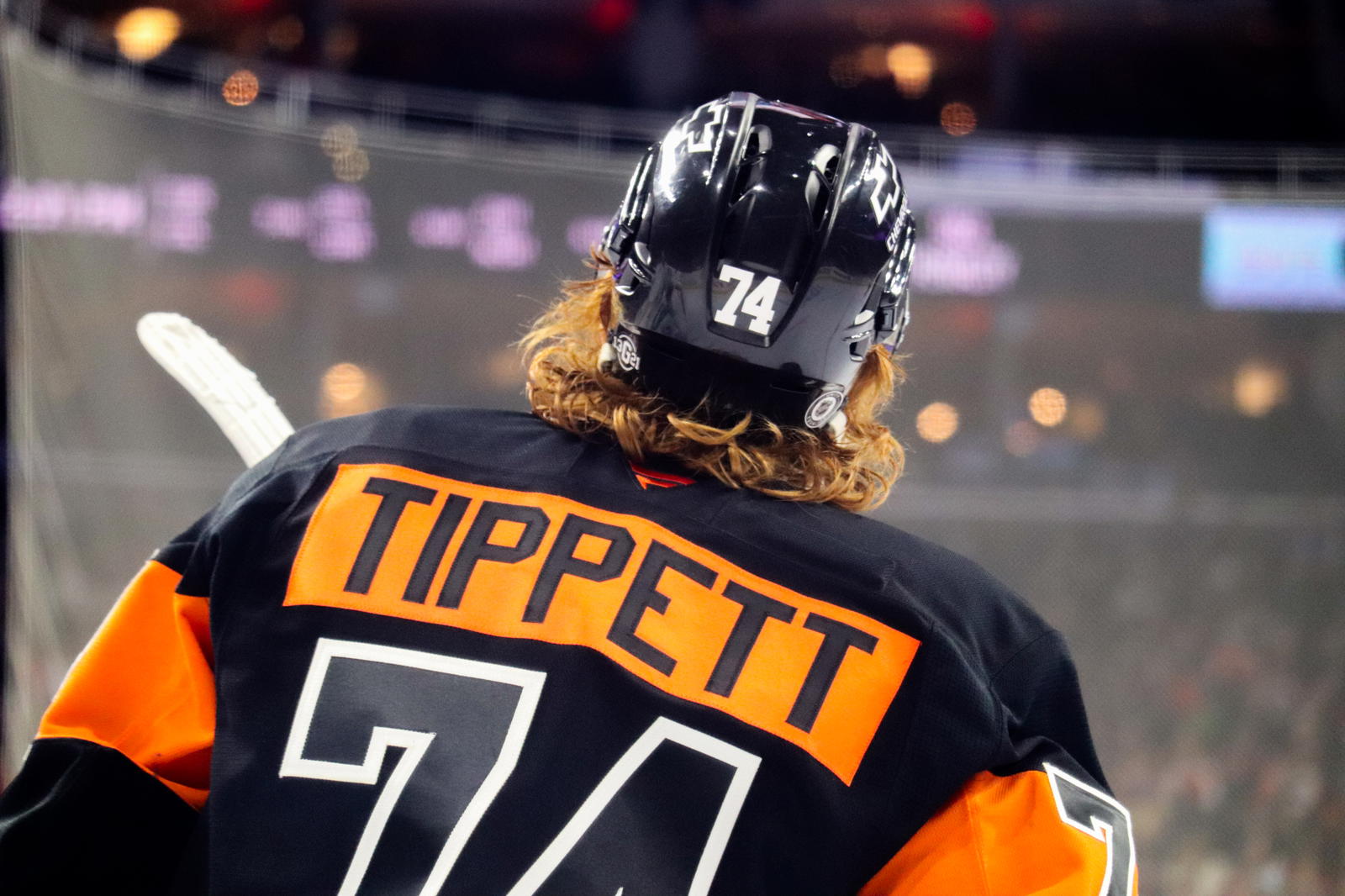
Philadelphia Flyers winger Owen Tippett (74). (Megan DeRuchie-The Hockey News)
Owen Tippett has never been one for excuses.
Even in a year that left him frustrated, banged up, and often chasing consistency, the 26-year-old forward faced his exit interview with the same forthrightness that defines his game: all effort, no sugarcoating.
“I think I had a lot of ups and downs,” Tippett admitted. “I think there’s room for improvement. I’ve said all year it’s just kind of being more confident in my abilities and being more consistent.”
That struggle for consistency was evident. After a promising 2023-24 season where Tippett emerged as one of Philadelphia’s most electric forwards, this year felt… stuck in second gear.
He wasn’t shooting the puck as often. His skating was still powerful, his effort still visible, but something seemed restrained—as if the wires were there, but the current wasn’t quite flowing the same way.

Philadelphia Flyers winger Owen Tippett (74). (Megan DeRuchie-The Hockey News)
And then there was the injury. Tippett missed key stretches in the second half of the season, just as the Flyers entered their most critical playoff push. It wasn’t just physically taxing—it was mentally brutal.
“It was one of those tough ones,” Tippett said of his injury. “Frankly, it was a little worse than we thought it was originally, so the break came at a good time. It’s still lingering a little bit with certain things. Any time you miss that amount of time, it’s going to be tough coming back.”
He doesn’t hide how much it stung to be watching from the press box while his team, short on scoring and facing mounting pressure, fell short.
“We did go through stretches where we hadn’t scored for a couple of games and I think that stretch where we got shut out for three or four games in a row, I was hurt,” he said. “Sometimes [it] sucks even more being able to watch, knowing you might be able to make a difference.”
It wasn’t just the physical absence that gnawed at Tippett. The pressure to be a difference-maker—especially on a team leaning more and more into its young core—became its own weight.
“I think that’s natural,” he said. “You want to be the guy to turn things around.”
And he can be. Tippett is one of the few Flyers with the speed, shot, and size combo that screams “gamebreaker.” But this season, even when healthy, he wasn’t letting it rip as often. He was told he had fewer shots on goal than last season.
“It’s news to me!” Tippett laughed. “I wasn’t aware of that. It’s such an unpredictable game with how things are going to go. A lot of the time, I was coming downhill with a lot more opportunity to shoot. Every time I get a chance, I’m going to shoot.”

Philadelphia Flyers winger Owen Tippett (74). (Megan DeRuchie-The Hockey News)
Still, those downhill looks were fewer. Whether it was the injury, the system, or simply a hesitancy creeping into his game, Tippett looked more reactive than instinctive at times. It didn’t help that the Flyers’ season was defined by a jarring midseason coaching change, with John Tortorella stepping back and Brad Shaw taking the reins.
“I’ve gone through it once before,” Tippett said. “It’s never easy, but part of the responsibility falls on the players. We do that in the room and we wanted to make sure we were doing our part to fix things the best we could. Obviously, [Brad Shaw] stepped in. It’s been a while since he’s been put in that role, so when it comes to that, it’s just helping each other out.”
Tippett spoke highly of Shaw, particularly how he transitioned from overseeing the defense to running the whole bench.
“You’re with him all year and you see how smart he is… and for him to express his feelings throughout the whole team instead of just the defense and kind of get to learn more about him with the forwards and seeing him more, it was nice. He sees the game really well, and he can make adjustments on the fly, which is good.”
As the season sputtered out and the Flyers missed the playoffs, Tippett took time to reflect—not just on his own game, but on his place in the room.
“I think it’s just a matter of being more consistent and taking that next step in a higher role,” he said. “I think with everything that happened with moves or whatever, it kind of caused me to realize that maybe I might be a little bit older than I feel.”
Part of that realization came with watching Joel Farabee and Morgan Frost—two close friends—get shipped out midseason.
“Frosty and Beezer was a really tough one for me,” Tippett said. “Those are guys I knew before I even got traded here, and just the shock factor of it all was tough for me. Obviously, you have guys like [Scott Laughton] and [Erik Johnson]—it’s never easy to see those guys who have big roles in the room and were big parts of our locker room go. In my experience, a trade kind of helped me, so I’m excited for those guys, but we definitely miss them.”
Tippett, of course, was once a trade piece himself—sent to Philadelphia in the Claude Giroux deal that marked the dawn of this rebuild. Now, with a long-term contract in hand and a permanent home in Philly, he’s a cornerstone of what the Flyers are building.
Next season is about growth. Healing. Resetting. And unleashing the version of Owen Tippett that, deep down, he knows is still waiting to break through.
“I’m just seeing where that goes and reset and take some time and just get away from the game for a little while,” he said. “Come back with a clear mind next year.”
He’ll need it. Because the Flyers still believe Tippett can be one of their best players.
And so does he.
-1745547909-q80.webp)

-1745394407-q80.webp)
-1740891445-q80.webp)